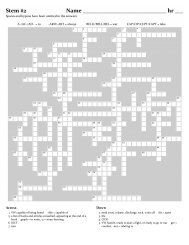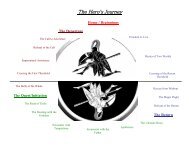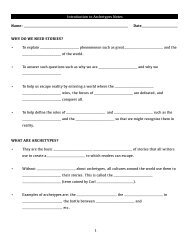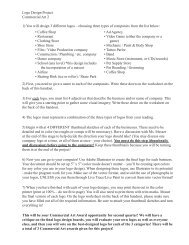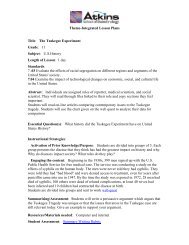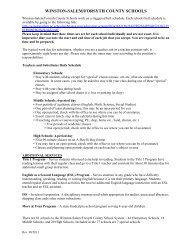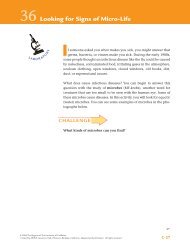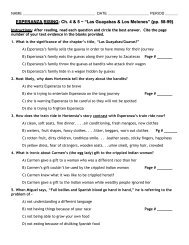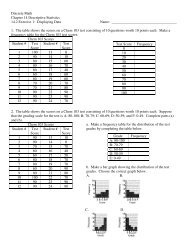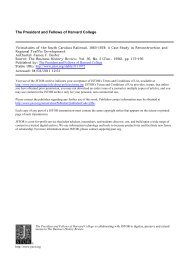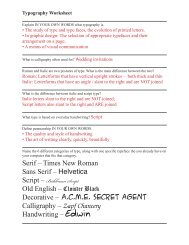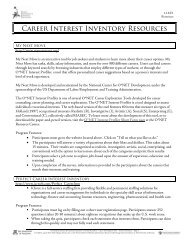Create successful ePaper yourself
Turn your PDF publications into a flip-book with our unique Google optimized e-Paper software.
Your essay will be evaluated on the evidence it gives ofyour ability to do the following:• express judgments by taking a position on the issue inthe writing prompt;• maintain a focus on the topic throughout the essay;• develop a position by using logical reasoning and bysupporting your ideas;• organize ideas in a logical way; and• use language clearly and effectively according to theconventions of standard written English.Your essay will be scored holistically—that is, on the basisof the overall impression created by all the elements of thewriting. Two trained readers will score your essay, eachgiving it a rating from 1 (low) to 6 (high). The sum of thoseratings is your Writing subscore. If the readers’ ratingsdisagree by more than one point, a third reader willevaluate your essay and resolve the discrepancy.Tips for Taking the <strong>ACT</strong> Writing <strong>Test</strong>Pace yourself.The <strong>ACT</strong> Writing <strong>Test</strong> gives you 30 minutes to read andthink about the issue in the prompt, and to plan and writeyour essay. When asked to write a timed essay, mostwriters find it useful to do some planning before they writethe essay, and to do a final check of the essay when it isfinished. It is unlikely that you will have time to draft, revise,and recopy your essay. Therefore, taking a few minutes toplan your essay is a much better strategy than writing afirst draft <strong>with</strong> the intent to copy it over for the final essay.Prewrite.Some writers like to plunge right in, but this is seldom agood way to do well on a timed essay. Prewriting gets youacquainted <strong>with</strong> the issue, suggests patterns for presentingyour thoughts, and gives you a little breathing room tocome up <strong>with</strong> interesting ideas for introducing andconcluding your essay. Before writing, then, carefullyconsider the prompt and make sure you understand it—reread it if you aren’t sure. Decide how you want to answerthe question in the prompt. Then jot down your ideas onthe topic: this might simply be a list of ideas, reasons, andexamples that you will use to explain your point of view onthe issue. Write down what you think others might say inopposition to your point of view and think about how youwould refute their argument. Think of how best to organizethe ideas in your essay. You will be instructed to do yourprewriting in your Writing <strong>Test</strong> booklet. You can refer backto these <strong>notes</strong> as you write the essay itself on the linedpages in your answer folder.Write.Once you’re ready to write your essay in the answer folder,proceed <strong>with</strong> the confidence that you have <strong>prep</strong>ared welland that you will have attentive and receptive readers whoare interested in your ideas. At the beginning of youressay, make sure readers will see that you understand theissue. Explain your point of view in a clear and logical way.If possible, discuss the issue in a broader context orevaluate the implications or complications of the issue.Address what others might say to refute your point of viewand present a counterargument. Use specific examples.Vary the structure of your sentences, and use varied andprecise word choices. Make logical relationships clear byusing transitional words and phrases. Do not wander offthe topic. End <strong>with</strong> a strong conclusion that summarizes orreinforces your position.Is it advisable to organize the essay by using a formula,like “the five-paragraph essay”? Points are neither awardednor deducted for following familiar formulas, so feel free touse one or not as best suits your preference. Some writersfind formulas stifling, other writers find them vital, and stillother writers just keep them handy in the toolbox to usewhen needed. The exact numbers of words andparagraphs in your essay are less important than the clarityand development of your ideas. Writers who havesomething to say usually find that their ideas have a way ofsorting themselves out at reasonable length and in the rightnumber of paragraphs.Review your essay.Take a few minutes before time is called to read over youressay. Correct any mistakes in grammar, usage,punctuation, and spelling. If you find any words that arehard to read, recopy them so your readers can read themeasily. Make any corrections and revisions neatly, betweenthe lines (but not in the margins). Your readers take intoaccount that you had merely 30 minutes to compose andwrite your essay. Within that time limit, try to make youressay as polished as you can.<strong>Prac</strong>tice.There are many ways to <strong>prep</strong>are for the <strong>ACT</strong> Writing <strong>Test</strong>.You may be surprised that these include readingnewspapers and magazines, listening to news analyses ontelevision or radio, and participating in discussions anddebates about issues and problems. These activities helpyou become more familiar <strong>with</strong> current issues, <strong>with</strong> differentperspectives on those issues, and <strong>with</strong> strategies thatskilled writers and speakers use to present their points ofview.Of course, one of the best ways to <strong>prep</strong>are for the <strong>ACT</strong>Writing <strong>Test</strong> is to practice writing. <strong>Prac</strong>tice writing differentkinds of texts, for different purposes, <strong>with</strong> differentaudiences in mind. The writing you do in your Englishclasses will help you. So will practice in writing essays,stories, poems, plays, editorials, reports, letters to theeditor, a personal journal, or other kinds of writing that youdo on your own. Because the <strong>ACT</strong> Writing <strong>Test</strong> asks you toexplain your perspective on an issue in a convincing way,writing opportunities like editorials or letters to the editor ofa newspaper are especially helpful. <strong>Prac</strong>ticing a variety ofdifferent kinds of writing will help make you a versatilewriter able to adjust to different writing occasions andassignments.It is also a good idea to get some practice writing <strong>with</strong>in atime limit. This will help build skills that are important incollege-level learning and in the world of work. Taking thepractice <strong>ACT</strong> Writing <strong>Test</strong> in this booklet will give you agood idea of what timed writing is like and how muchadditional practice you may need. You might want to takethe practice <strong>ACT</strong> Writing <strong>Test</strong> even if you do not plan toregister for it, because all the writing you do contributes toyour skill in expressing yourself.10



